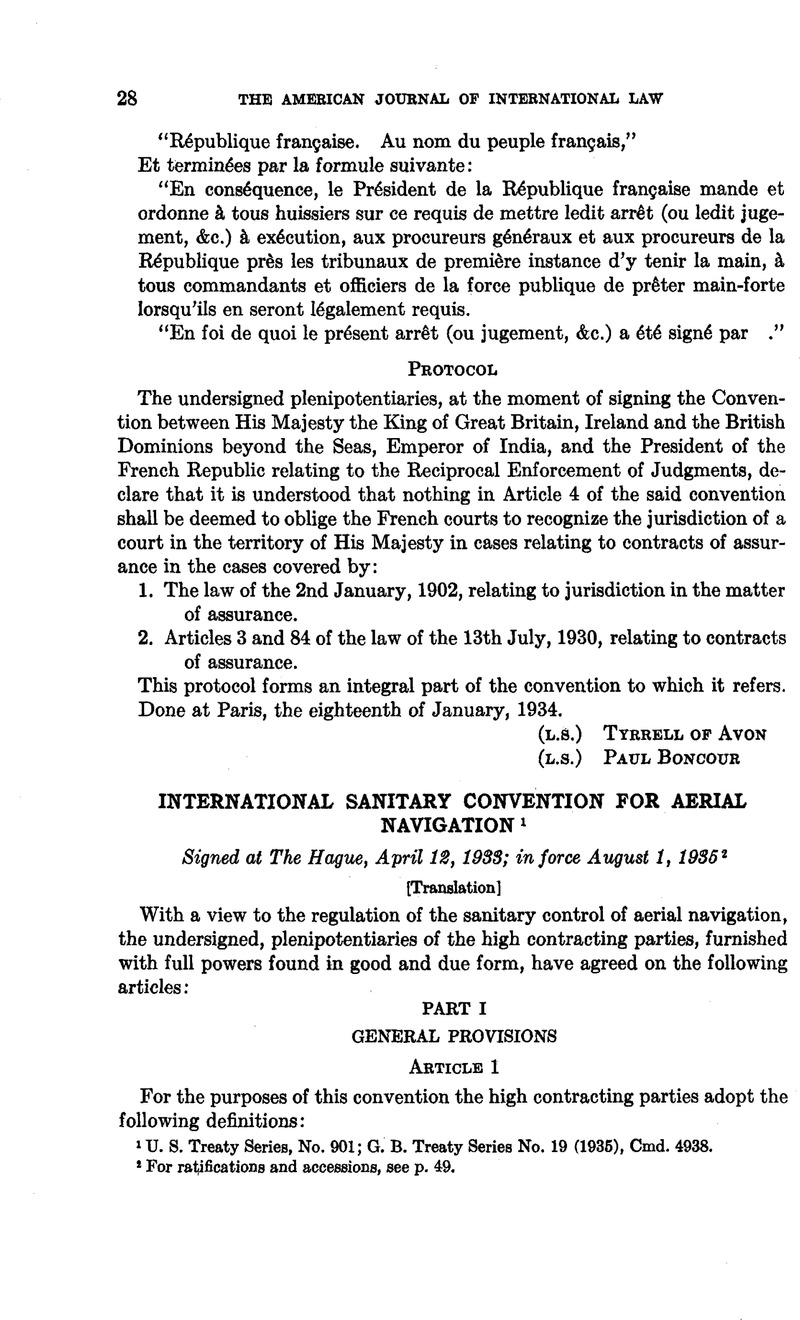Article contents
International Sanitary Convention for Aerial Navigation
Published online by Cambridge University Press: 12 April 2017
Abstract

- Type
- Official Documents
- Information
- American Journal of International Law , Volume 31 , Issue S1: Supplement: Special Documents , January 1937 , pp. 28 - 50
- Copyright
- Copyright © American Society of International Law 2012
References
1 U. S. Treaty Series, No. 901; G. B. Treaty Series No. 19 (1935), Cmd. 4938.
* According to the terms of the International Sanitary Convention of June 21, 1926, Art. 10 and the first paragraph of Art. 11, a local area is considered "infected" by one of the diseases in question in the following circumstances: For plague and yellow fever, when the first case recognized as nonimported is reported; for cholera, when forming a “foyer”–that is, when the occurrence of new cases outside the immediate surroundings of the first cases proves that the spread of the disease has not been confined to the place where it began; for exanthematous typhus and smallpox, when they appear in epidemic form. [Footnote in the original.]
2 For ratifications and accessions, see p. 49.
3 By virtue of a notification given to the Netherlands Government by the British Government on Apr. 3,1935, in accordance with the second paragraph of Art. 65 of the convention, the convention applied, from Aug. 1, 1935, to the Bahamas; Barbados; Bermuda; British Guiana; British Honduras; Cyprus; Falkland Islands and Dependencies; Gold Coast: (a)Colony, (6) Ashanti, (e) Northern Territories, (d) Togoland under British mandate; HongKong; Kenya (Colony and Protectorate); Leeward Islands; Antigua, Dominica, Montserrat,St. Christopher and Nevis, Virgin Islands; Malay States: (a) Federated Malay States: Negri Sembilan, Pahang, Perak, Selangor; (6) Unfederated Malay States: Johore, Kedah, Kelantan, Perlis, Trengganu and Brunei; Mauritius; Nigeria: (a) Colony, (6) Protectorate, (e) Cameroons under British mandate; State of North Borneo; Nyasaland Protectorate; Palestine (excludingTrans-Jordan); Sarawak; Sierra Leone (Colony and Protectorate); Southern Rhodesia; Straits Settlements; Tanganyika Territory; Trans-Jordan; Uganda Protectorate; Zanzibar Protectorate.-EDITOR.
4 Subject to the two reservations made at the time of signing the convention on April 6,1934 (see p. 47, supra).
5 Subject to the following reservations:
[Translation]
(a) As regards Article 61, amendments to the convention which may become obligatory on the Brazilian Government must in the first place be accepted by the Brazilian Government.
(b) The Brazilian Government reserves the right to determine whether, from the point of view of the measures to be applied, a foreign area must be considered to be infected, and to prescribe the measures to be adopted, under the special circumstances, in regard to aircraft and persons arriving in a Brazilian aerodrome.
6 Subject to the following reservation:
The Government of Iraq reserves the right to accept only those certificates which are signed by a recognized official of the Public Health Services of the country concerned, and which carry within the text of the certificate an intimation of the office occupied by the person signing that certificate, if the circumstances appear to be such that certificates delivered under the conditions laid down in Article 32 of the convention do not provide all the necessary guarantees.
By virtue of the authority vested in me by Section 1752 of the Revised Statutes (U. S. C , Title 22, Section 132) I hereby prescribe Section XVI-21 of the Instructions to Diplomatic Officers and Section 459 of the Consular Regulations of the United States to read as follows:
“Before contracting marriage with a person of foreign nationality each Foreign Service officer shall request and obtain permission so to do from the Secretary of State under such instructions as may be issued by him, and any officer who shall contract marriage with an alien without obtaining in advance the authorization of the Secretary of State shall be deemed guilty of insubordination and shall be separated from the Service. Each request for permission to marry an alien shall be accompanied by the officer's resignation from the Foreign Service for such action as may be deemed appropriate.”
“No person married to an alien shall be designated to take the entrance examinations for the Foreign Service.”
“This regulation is based upon the principle that officers of the Foreign Service are expected to be available in the discretion of the President for duty in any country or in any part of the world, and that anything which detracts from the availability of individual officers has an adverse effect upon their usefulness and upon the efficiency of the Service.”
- 1
- Cited by


